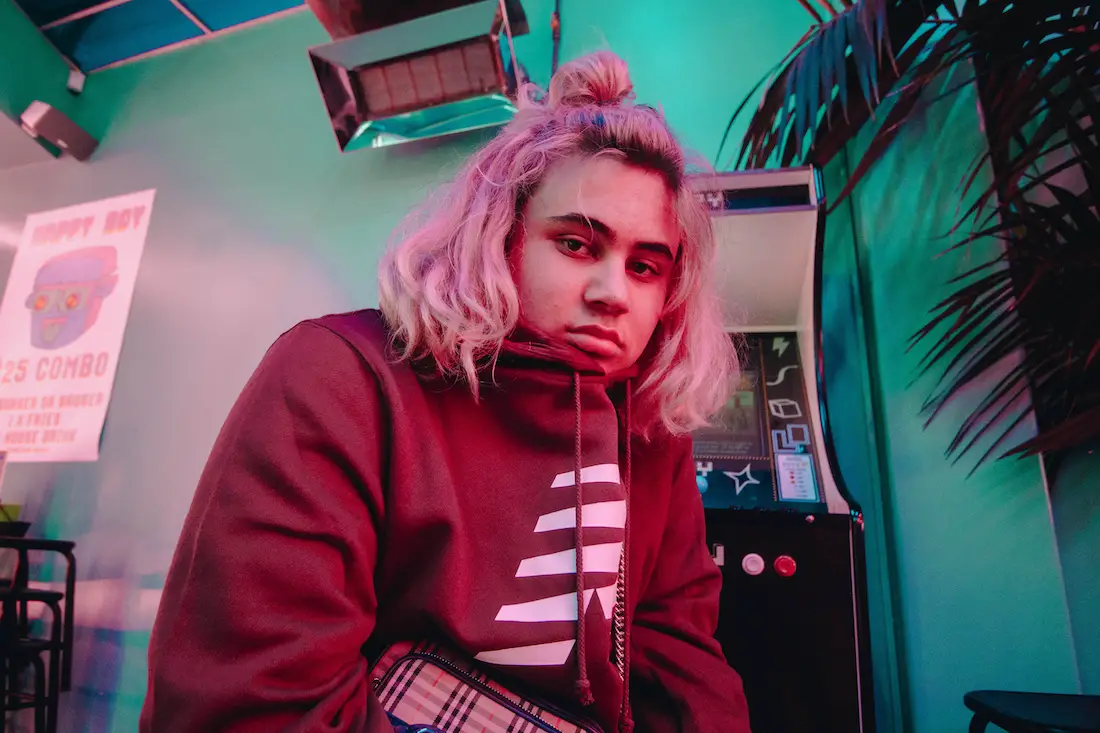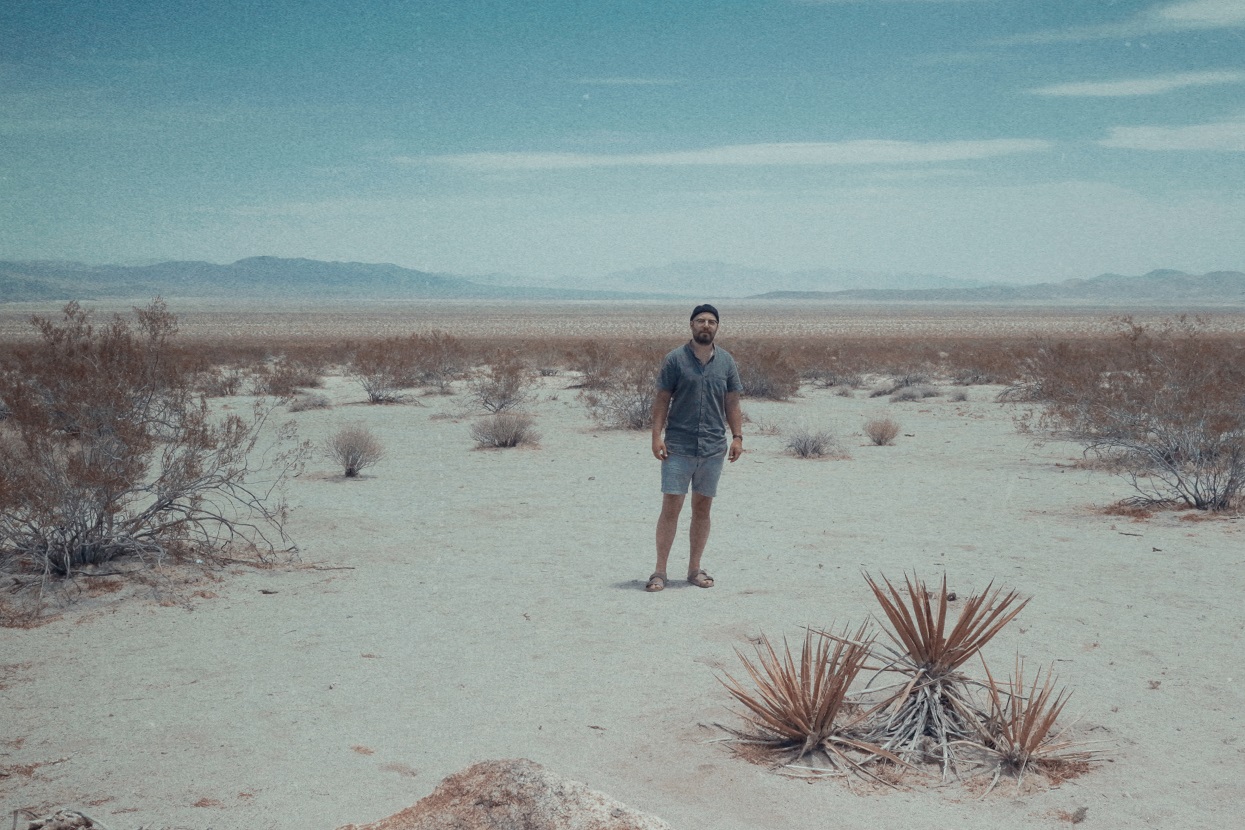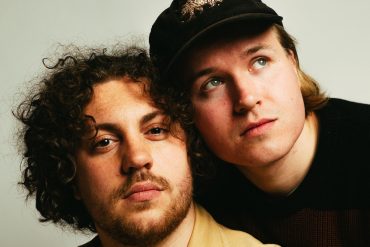My Morning Jacket’s Carl Broemel joins Atwood Magazine to discuss his approach to music as both artist and audience member, the spiritual spark behind their tenth album ‘is,’ and how – twenty-five years in – the live show remains the band’s beating heart and the stage their true home.
Stream: ‘Is’ – My Morning Jacket
Music isn’t just a passion – it’s a way of life, a compass, and for some, a kind of sacred calling.
It’s how we make sense of the world, how we connect to each other, and how we stay grounded when everything else is in flux. One might say it just is.
For Carl Broemel of My Morning Jacket, music is all of that and more: A lifelong pursuit that has evolved from youthful fervor into a steady, soul-nourishing rhythm – a rhythm that still pulses with as much heart as ever. Two decades into his time with the band, Broemel remains as deeply rooted in the work as he is energized by it, driven by curiosity, camaraderie, and an ever-renewing sense of purpose. From their genre-defying early days to the commanding confidence of their latest release, is, My Morning Jacket have come to embody the art of longevity – not by chasing trends or clinging to the past, but by showing up fully, year after year, to meet the music where it lives: Embracing not just their chosen art form, but the live performance, the human connection, and the community that comes with it.
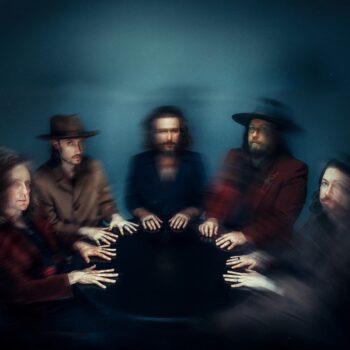
For Broemel and his bandmates (vocalist/guitarist Jim James, bassist Tom Blankenship, drummer Patrick Hallahan, and keyboardist Bo Koster), is marks a special kind of milestone. Recorded at the iconic Henson Studios with veteran producer Brendan O’Brien (Bruce Springsteen, Pearl Jam), the band’s tenth album is tight, focused, and brimming with life. Where 2021’s self-titled My Morning Jacket leaned into looseness and long-form jams, is is sharp and intentional, built from the ground up as a set of songs meant to thrive onstage. “We’re always releasing an album in a way,” Broemel muses, pointing to the band’s post-show live recordings. “But I think our natural habitat is the live part.”
Speaking candidly with Atwood Magazine, My Morning Jacket’s longtime jack-of-all-trades dives deep into the creative process behind is, from the band’s communal approach to writing and arranging to the studio philosophy that emphasized pacing and momentum. Broemel opens up about My Morning Jacket’s internal chemistry, their hard-won lessons around collaboration, and how a simple question – “What if we took it one more step?” – helped shape one of their most cohesive records to date.
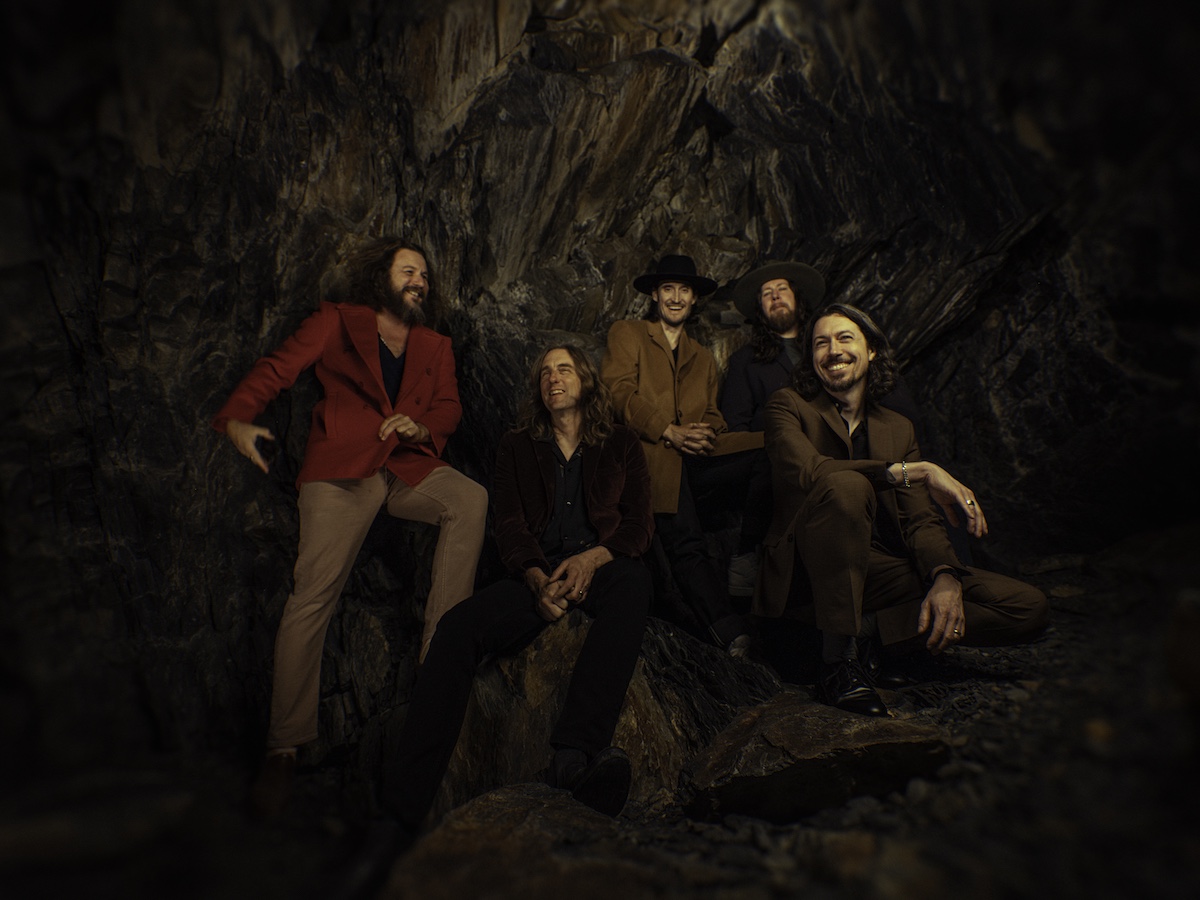
But for all the care that went into crafting is, the band haven’t lost sight of what matters most. “A show is alive,” Broemel says. “A recording is a relic.”
Whether he’s talking about discovering new arrangements mid-tour or finally cracking the code on a 20-year-old song like “Half A Lifetime,” there’s a quiet conviction behind his words: that music is meant to evolve, breathe, and connect. With is, My Morning Jacket have created something that does just that – an album made to meet its full potential under the stage lights.
These songs aren’t just made for the stage—they ask to be felt in real time. The hypnotic opener “Out in the Open” sets the tone with a slow, insistent rhythm and a sense of uplifted stillness; Jim James’ voice becomes an anchor in uncertainty as he sings, “Well, I know the past is hazy and the future scares you, too / But I feel my heart is breaking in the present without you.”
There’s grace in the way the band delivers its message of steady hope, like sunlight cresting over a valley:
Out in the open the night runs cold
But with the dawn, our world’s aglow
In the light of the sun, the waters run
Into the valley below
From there, is flows effortlessly between moods and textures – the punchy beat and muscular groove of “Half a Lifetime,” the dreamlike shimmer of “I Can Hear Your Love,” the blues-rock bite of “Squid Ink,” and the lush, wondrous warmth of “Time Waited.” With its radiant pedal steel, sweeping melodies, and slow-burning catharsis, “Time Waited” carries the soul of a sunrise – inviting listeners to exhale, reflect, and step forward with open arms.
“I’m a pedal steel player,” Broemel shares, “and the song was sampled from a Buddy Emmons song from a long time ago. So I was pretty stoked about shining light on Buddy, because he’s a hero.” Anchored by its chanted refrain – “If we don’t watch out (time waited), time will run off on us / But if we move right now (time waited), all of the world’s here for us, ain’t no spare time” – the song becomes a meditation on urgency and grace, a reminder to be fully present in the now. It’s an embrace of presence and patience, of seeing life not as a race, but as something to move through with wonder – one that already feels like an instant classic in the My Morning Jacket songbook. If is has a heartbeat, this might just be it. Even at their most ethereal, the band’s intention is clear: Connection, elevation, awareness, and being.
Well, they say time waits for no one dear
And it takes near death to show one, yeah
But time waited for you and me
We know real love takes forever, yeah
And the clock ticks faster every year
But time waited for you and me
And if we don’t watch out (Time waited)
Yeah, and if we don’t watch out
Time will run off on us
But if we move right now (Time waited)
All of the world’s here for us
Ain’t no spare time
That spirit – of music as both vocation and communion – runs deep through is, an album born not just of artistic vision, but of lived experience.
It’s the sound of a band rooted in its purpose and still reaching, still listening, still learning. Two and a half decades in, My Morning Jacket continue to live their music in every sense: Not only performing it, but embodying it – in rehearsal rooms, on long drives, in quiet moments of doubt and clarity alike.
In our conversation, Broemel reflects on the spiritual center of the band, the value of pacing in both life and touring, and why being present – really present – is what fuels their creativity now more than ever. “It really helps to just focus on what’s happening right now,” he says. “That’s the one thing I could do to make the world better.”
It’s a sentiment that radiates through is, and one that reminds us why My Morning Jacket remain so beloved – and why they continue to be one of the most enduring and vital forces in modern rock, twenty-five years into their journey.
is is out now on ATO Records. Catch My Morning Jacket on tour this spring, summer, and fall – find tickets and more information at mymorningjacket.com!
— —
:: stream/purchase is here ::
:: connect with My Morning Jacket here ::
— —
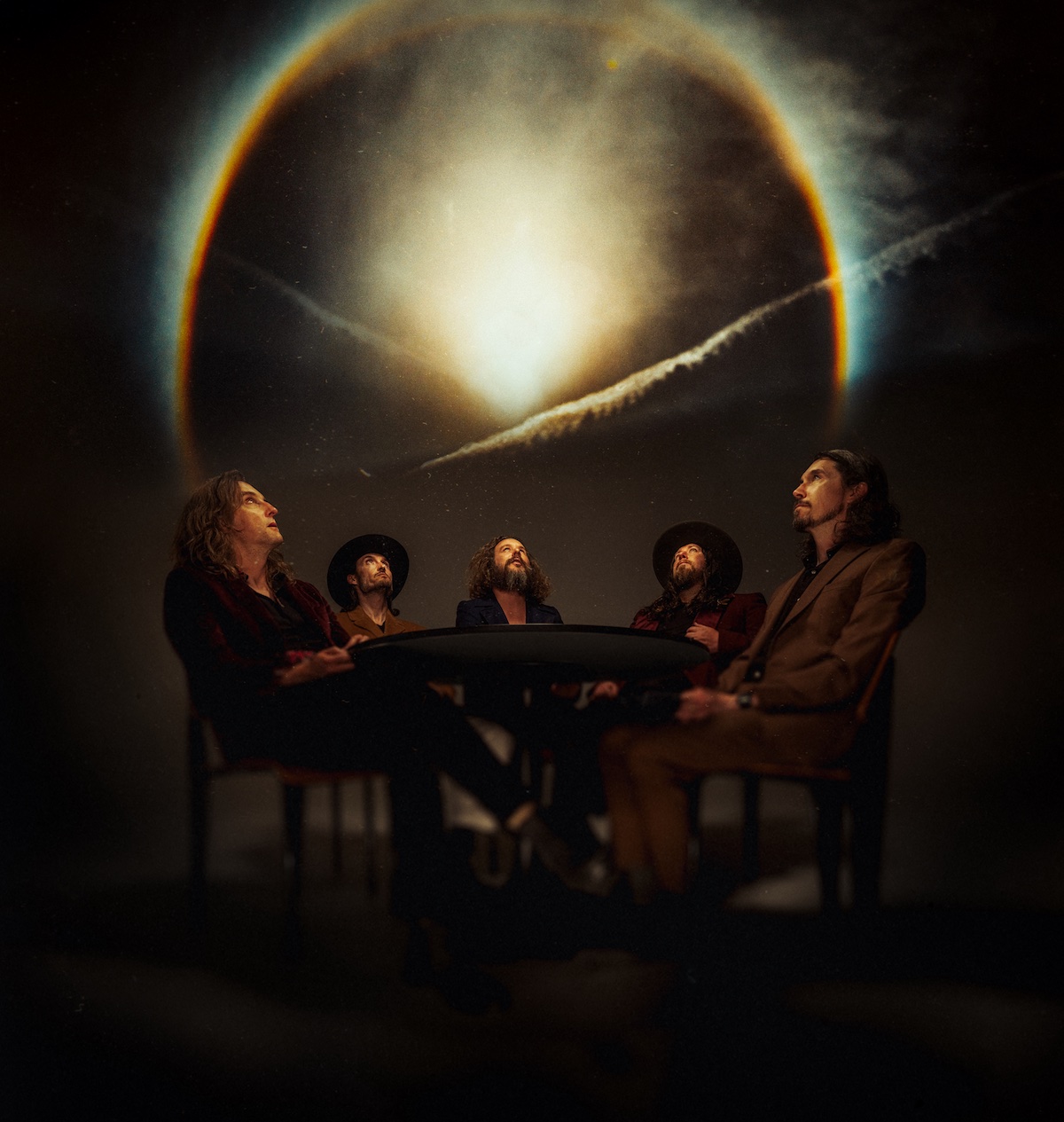
A CONVERSATION WITH MY MORNING JACKET
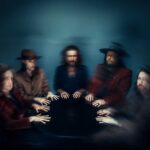
Atwood Magazine: Carl, you’ve been in the band for about 20 years now. Before we zoom into the specifics of today, I was hoping you could share how you feel My Morning Jacket has grown and evolved over the past 20 years?
Carl Broemel: Man, it’s hilarious because it’s just like, I don’t know if you have kids, but it’s just so subtle and slow. Like a slow evolution, slow growth. But there’s been a couple things that’s happened lately. We re-released our Bonnaroo show from 2005 and we had to watch the footage and we were like, who are those people? Like hanging out before the show, smoking a cig, like having a beer. I don’t even know what we were thinking. We were literally those 20-year-old, well, 30-year-old musicians at a festival, wandering around with beers, like just having a good old time, not really thinking too much about anything, not thinking, oh, this is going to last 20 years. So from that point, that was pretty early. For me, that was like the first year of my time in the band. Man, we’ve grown closer and we’ve taken some good breaks and we’re starting to learn how to pace ourselves a little bit. So we have more fun times than like hard, stressful times. It’s one of the things, I guess, that’s changed the most.
I mean, a lot of us have families now, so the go get him is still there. We really enjoy playing still. The thing that stayed the same is the feeling of being on stage, that’s sort of evergreen, which is really cool. Like that it still can be fresh and fun. Especially some nights where we’re like, wow, that was a really good one. Like, how do we do that? We’re like, I don’t know, not every show is like that, but that has stayed the same. But coincidentally with that, we’ve learned to communicate, we’ve had a lot of ups and downs with like trying to be creative together and collaborate and we just had to like push our way through all that. And luckily, when we actually did give ourselves the chance to be like, are we done? We literally were like, okay, let’s take a second and let’s think about this. And it was clear that we weren’t, so it was like we weren’t just doing it to do it. We got to that point. Does that make sense? Like, we allowed ourselves to not have to do it. And we decided we still wanted to go. So that’s kind of where we’re at now. And it’s pretty fun, honestly. It’s really fun. I’m really grateful that we’re not at the beginning stages anymore.
One of the things I noticed right off the bat for the schedule this year is you're doing a month on, a month off with the tour. I just appreciate that pacing, because there's a time when you would have just been out on the road for 90, 100 days and just done it all in one fell swoop.
Carl Broemel: I mean, I’m sure you’ve seen the Last Waltz and Robbie Robertson’s like, it’s a goddamn impossible way of life. I remember watching that and being like, why is he a wimp? ‘Cause I was a teen, I was like 20. I’m like, that’s all I want to do. So I didn’t understand at all. But I kind of understand where if you don’t say no and you don’t pace yourself and make sure you stay focused on whatever your goal is. And our goal is more like, let’s pace ourselves and have a good time. And it’s not so much like, let’s take every opportunity ’cause we’ll never get another opportunity again. And thankfully, there’s no drug use. There’s basically no alcohol happening. There’s no smoking. It’s like, we’re living a healthy life. And I don’t think the band, Robbie Robertson and the band, I don’t think they were living healthy lives. I think it was a totally different era. So that made it goddamn impossible for them, I think. But for me, it’s not impossible. It’s like. It’s all I’ve ever wanted to do. I’m still kind of that guy. Like, yeah, it’s impossible. But you can figure it out.
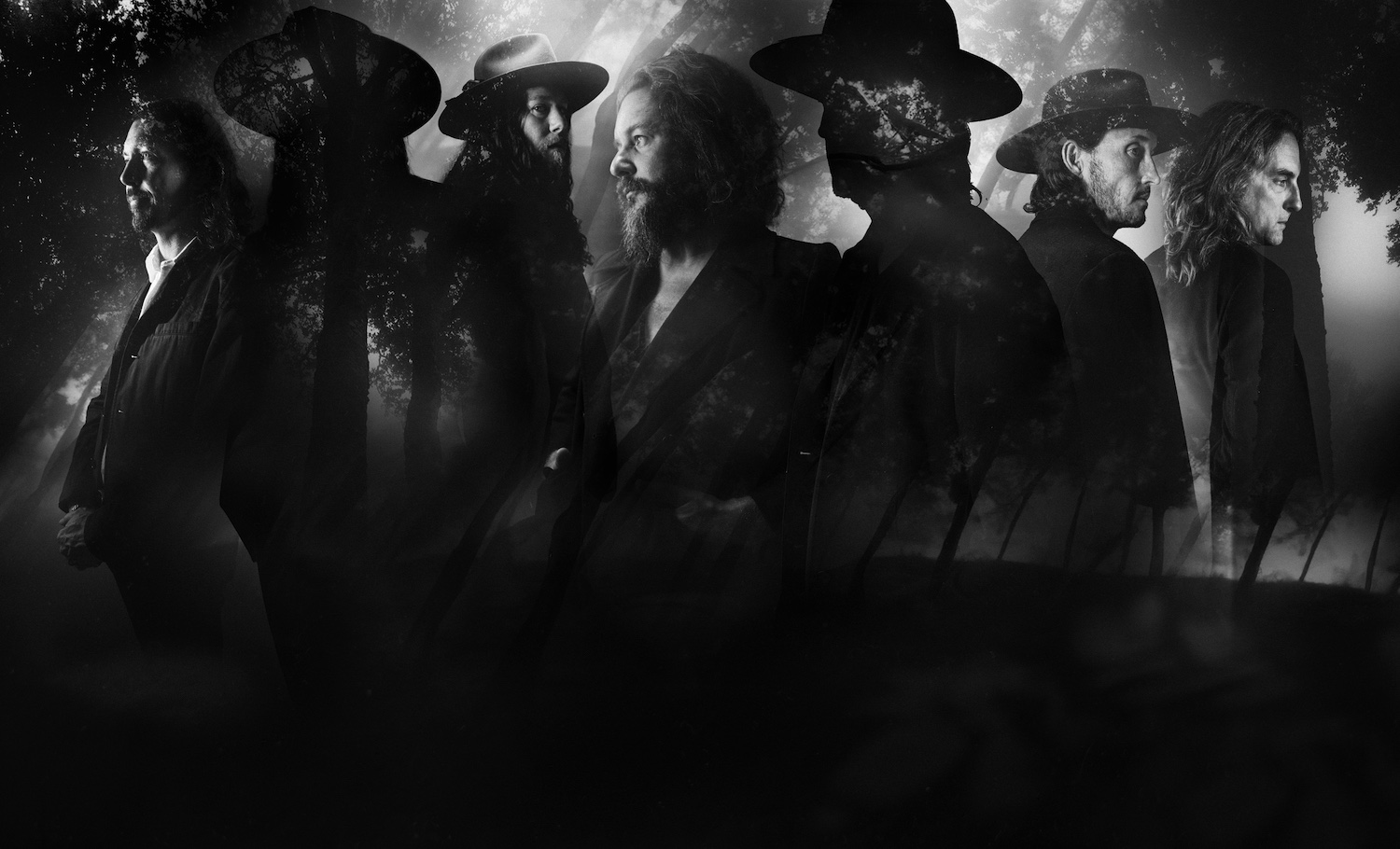
One thing you mentioned earlier was, we've all changed, but what stays the same is that feeling that you get on stage. Artists are these funny figures where so much of your creative work you do behind the scenes and closed doors, and then you have this entire other side of the job, which is performing onstage and entertaining people and creating this communal experience. Where does My Morning Jacket fall on the spectrum of embracing recordings and studio albums on one end, and the live show on the other?
Carl Broemel: I think our natural habitat is the live part because we get that instant feedback on whether things are resonating or working, whether among ourselves or just like, looking out in the crowd and feeling it. So that’s kind of our natural habitat. In the studio is a little more difficult usually. Not that it’s not fun and we can’t get good results, but it’s a little trickier sometimes.
It’s fun to play one song once and move on in the studio. Unless you can manage to get the pacing right, you end up kind of zeroing in on something and then almost you can’t. You can’t step away from it. You need to take a break. It can be very challenging because, for us, the act of performing is kind of an emotional release.
So it’s kind of hard sometimes to really have a good perspective on whether it was a good performance. I was really feeling it. And you listen back and you’re like, yeah, I don’t know. Going back to the drinking and stuff, I used to think we had an incredible show, and then I’d go back and listen to it and I’d be like, that was not a good show. I was just buzzed, you know what I mean? And it was fun. There’s nothing wrong with a fun show that goes off into the world and you never have to hear it again. But I think that may be one thing that’s changed. It’s like, I really, really do care what the show sounds like and what the performance is of a certain level. To us, it’s not satisfying otherwise. If I can’t listen back to the show, and be like, that was pretty good, I’m like, I can’t be satisfied with the tour, so.
And we do release a lot of the shows now, like, right after we play, so that kind of needs to be a part of it too. So we’re always releasing an album in a way, so we get… But I think we’re kind of like the who in a way. We’re not as great as the who or whatever, but I think the who struggled in the studio, from what I understand. And I think they’re kind of the same thing. When you listen to Live at Leeds, that’s The Who, right? And you listen to some of the albums, they feel contained – and it’s almost like they’re trying to burst out of the record… aside from Who’s Next – Who’s Next is a masterpiece. But the other records, I’m always like, oh, man, it could be more fun, right?
For this album, we did a lot of demos on our own, and then we ended up hiring Brandon O’Brien to help us kind of navigate that. And he became our coach and our audience while we were in the studio, and it was great. We really need someone else to help us. We have a tendency to get myopic and go down a black hole with a song and spend three days on it. And it’s like, that’s just not necessary. It’s better to just move on and come back. And you need to kind of have someone be like, hey, this isn’t working. Let’s just do the next one and we’re like, oh, okay. And then, when we made the record with him, it’s like every day we start and finish a song, essentially, and it was so fun because it never felt… Yeah, we spent a whole day on a song, but we didn’t spend multiple days on a song in a row, so that was great.
One thing that I felt right off the bat was that these are going to sound good live. There's an energy to is – it feels like these songs were recorded with the concert in mind. Is that an approach that you guys have going in?
Carl Broemel: Well, the work we did to get the songs together was us standing in a circle, playing everything at the same time, pretty much. A couple songs that we sort of built from a drum loop or whatever and played on top of it, but we rehearsed it in a way that it was already like our natural thing, our natural set up. So, yeah, and like, it’s a little bit… We spent a long time thinking about set lists a lot when we’re on tour and trying to have surprises and variety and new songs and old songs or whatever. And this record is pretty… I would say this record is pretty upbeat for us. There’s not a whole lot of more introspective songs on here, which is a part of what we’ve done and we’ve done it well already.
So it’s sort of like, okay, what if this record, we kind of focus more on this aspect of the band that has a little more upbeat energy to it and the introspection is always going to be there. Really the only song that’s kind of maybe reminiscent of the past is the last song. And the rest of the songs to me feel somewhat fresh. I mean, we always have… We have the same habits and tendencies as musicians, so we always kind of sound like us, but we are definitely trying to take a different door.
I can seriously imagine “Time Waited” going on for a 20-minute loop and just seeing what you can get up to by expanding it. Now, this record's being “marketed” as having had a different approach. Not only did you pull in someone else to produce it, but it is a band communal experience where you made the songs together. Can you talk to me a little bit about the story behind is in that way, and how these songs came to be?
Carl Broemel: Yeah, we all spent a lot of time working on it before we got to the studio. There was a lot of… Jim had a ton of demos, so he had so many ideas and everyone had their favorite songs and we kept trying to put them into groups and then we’d go in the studio and we’d work on a song and make a demo. And we did that for two months. We thought we were recording. And every time you’re recording, it could always be the record. You know what I mean?
And when we got to the end of that and we listened to everything and we’re like, okay, we could put this out, but what if we took it one more step? And so we did so much work, the five of us, which is great. We do like to work that way where we don’t have someone else’s energy. We can just keep the world at bay. No one expectations… We work in secret just like we’re working on something. When we’re ready, we’ll let you know. And so, when we got to the point where we like, okay, this is as far as we can take these right now.
So we met with some producers. Our manager, Michael, was also like, yeah, you guys, this is great. These are all super cool ideas. Great songs. Are you down to go the extra mile? And we’re like, Yeah, we want to go the extra mile. And why wouldn’t we at this point? And so we met with some producers and connected with Brendan and we were all… I mean, obviously, some of the records he made were the ones, my favorite ones, in high school and college. And he has a great, no-nonsense approach to creativity and making suggestions and constructively helping us, it was cool as hell. It was cool to see. And so it just kind of snowballed. Once we got together with him and we were… He took all of our categories of songs and he made his own out of those. And that’s what we worked from, and it was kind of nice to, instead of everyone, it was more like, let’s put a little trust in him and let him lead us into this.
And then when we got into there, he helped us discover some stuff about each song that was already there. But he was like, this one’s catching my ear. Let’s work on this. And we’re like, okay, cool. Because we would have been happy to work on any of them. So in that way, it was really fun to have someone else kind of coach us. And I mean, he’s such a badass. And it was so fast. And he loved… He loves sounds, he loves arrangements. He’s really into arrangements. And he’s a guitar player and a piano player. He can play everything, so it’s cool. He’s like, not only an engineer, producer, but he’s a musician. And that’s the kind of person that we connect with, I think. We got to record at Henson Studios in LA, and the history there is so thick. It’s Charlie Chaplin’s studio. He built that place, right? And the Jim Henson company owned it. So there’s a big Kermit the Frog greeting you every day when you roll in there. And there’s the studio where Karen Carpenter recorded all of her songs. And there’s a big crystal on the back wall. It’s just a great place to be at, so we’ve got the spirits of those people we were excited to be around.
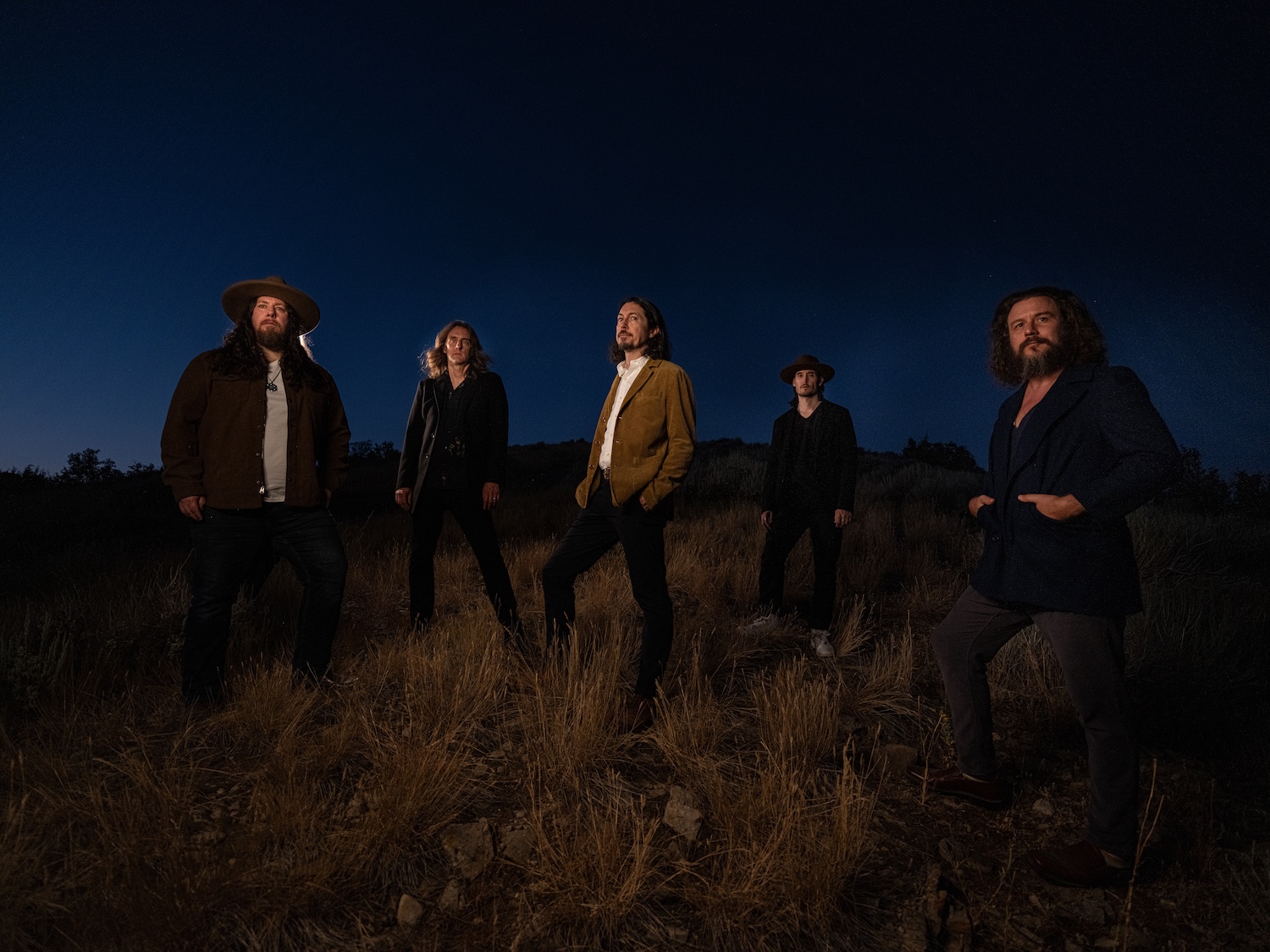
That's really cool. And I wonder how much the environment that you were in shaped the songs. I always found it so fun that My Morning Jacket released an eponymous album over 20 years into their career. The differences between this record and your last studio album are striking. I think that record is brasher. Many of its songs are a lot longer and have looser arrangements, whereas is feels tighter and more focused. I wonder, where do you see the differences between the last studio album and this one?
Carl Broemel: Yeah, the last record was really interesting to do because that was basically just the five of us in a studio pressing record and trying to wear many hats. And I think it’s cool. I like how… I like that the records are different, like, to me it makes sense in a way to be a little less like, lower the stakes sometimes. Lower the stakes sometimes and then raise the stakes sometimes. It’s kind of how we tend to go. And maybe we kind of go back and forth in reaction to what we did before. Like, we love to mix it up. We love to record in different towns and different ways, different people, because you end up spending a lot of time in a place like to revisit… Even on tour. We love going to new cities, new countries and stuff like that. Like, please just give us some new places to play. So that history of the band is kind of ripe with lots of change, of course. But I mean, the tightening of the arrangements and stuff was definitely maybe a product of working with Brendan and just zeroing in on stuff.
And I love working on song arrangements. If I’m helping a band or another person write a song, that’s like the part that to me can make or break a song and maybe we do decide to expand some of this stuff later for the live arena. And as I’m talking about this, maybe that’s been our problem in the studio. It’s like we’re trying to make the studio something it’s not and we know how to take a studio song or a tightly arranged song and expand upon it and have fun with it later. But sometimes we have trouble getting our ideas in the studio to be like the coolest version of a studio song. So I don’t know, I think it’s a process for us.
Was there any method to the madness behind the title “is”?
Carl Broemel: Well, with most things like titles and album covers, it’s Jim’s idea. He’s usually very opinionated and has cool ideas, and that was what he came up with. And I like things that are simple. Simple yet profound, maybe. I think it’s cool. It’s just like… It could mean whatever, I mean, to me, just on a personal level, trying to navigate the world in its current state, that’s very confusing and overwhelming. It really helps to just focus on what’s happening right now, just that really simple thing of, like, this is what is happening right now. This is the one thing that I could do to make the world better. Or like, let’s just focus on this. Like, you can’t get to… Like, you don’t want to fall all over yourself trying to save the world and make sure your opinions are heard and chime in on everything. It’s like, that kind of shit. This doesn’t work right now. It’s like, I heard someone talk about this, someone who decided to continue to play at the Kennedy center after Trump put himself on the board or whatever. And this guy was just like, you know what? I know my lane.
It’s not about staying in my lane. I’m learning my lane and like, obviously, we have opinions about what’s happening in the world, but we know our lane is, we’re musicians, we play music, we make records. We actually provide something without even talking about it that’s important. Like, it’s a communal experience that’s in person. Like, that’s our lane. That’s what we can do. So that’s what we’re going to focus on.
I really think these songs are very warm and welcoming and upbeat. It's funny how prescient the band and Jim's songwriting was to meeting the present moment. Now, is that you playing the opening guitar line in “Out In The Open”?
Carl Broemel: No, that’s actually a sample. Well, that’s Jim on ukulele. There’s a couple songs that Brandon was like, hey, we should use an element of the demo and just fly it in and we’ll all play to it. So we played to the bigga da ga da bigga da da. I think it’s falling on me to have to perform that at the show because Jim’s like, I can’t sing it and do it at the same time. I’m like, all right, I’ll do it. But, yeah, it turns into an electric guitar later. But, yeah, that’s a loop. And so we played along to that and reverse engineered that song.
I was hoping to start there, maybe dive into a couple of the songs briefly with you, and I think that one really does set the tone. What are the conversations over track listing like for you guys? Is there a similar attempt to create an overarching experience the way that you might with a concert? How do you feel that song sets the tone for the album ahead?
Carl Broemel: Yeah, the track listing is always just kind of experimenting and moving the blocks around. But, yeah, obviously, that one starts… That one’s just kind of like a ramp song. We have some other songs that are sort of similar where it’s like that there’s like an incessant rhythm that’s building and building and building, and then it kind of goes to the peak or whatever. Yeah, I think that one was just obviously a good one to start with because we thought about starting with the second song because it’s so weird. Like, we were like, oh, that’s cool. Like, if you put the record on and that was the first thing you heard, you might be like, what the hell’s going on? So, yeah, bum, bum, yeah.
We do. I mean, it is a little bit like a set list or “Out In The Open” will probably be a great song to start a show or the encore or whatever. And lately, we’ve been playing some of our old records front to back at shows, and I think that might have helped a lot with this record too, of being like, in 10 years, the anniversary tour of this record, we’re gonna have to play it front to back.
Every song better be a good life or not like 10 minutes long, and you kind of feel the… Some people go… You can see people walking to go to the restroom or whatever, and you’re like, all right, well, okay, can’t please everyone. But, so that might have been it. Honestly, I think playing those records live front to back has been really interesting. It makes you face your previous work in an interesting way. So this one will be all… I think this one will be great front to back at a show.
Have you been pleasantly surprised by any of the past records that really kind of hold up in your estimation just by playing them all the way through?
Carl Broemel: Yeah. I mean, we did Z and we did It Still Moves a couple times. That’s really fun to play front to back, and I think it’s a cool fan experience. If you’re really into a band and you’ve seen… Maybe seen us more than 10 times, to see an album front to back is kind of cool. It’s almost like I’ve been going to see like classic movies at a movie theater. How the shining starts and everyone’s laughing. You know what I mean? It’s like, you know what’s gonna happen, and it’s kind of a fun, communal experience to know what the next song is going to be or know where this is all going. So we’ve been doing that some. We’ll probably do some Z shows this year because that’s 20th anniversary. But we’re definitely focused on this record. That’s really our main focus.
Speaking of the lead single to this album, “Time Waited,” I have lost count of the number of times I think I've listened to that song at this point. And I think it, like, “Out in the Open” sets a perfect tone for the record overall. There's a warmth and a summeriness to that song that can't be beat. What was the decision behind going with that song first?
Carl Broemel: I let the label people decide. Knowing your lane is also trusting the people you work with. It’s sort of like, if I was like, clearly that’s not the best song or clearly, that’s a terrible idea, I would have said something. But it’s kind of like, for me, I try to chime in when I can be helpful, and if I see something, I’m like, oh, that’s cool, because I don’t know how it works anymore. Like, the strategy that made sense 20 years ago, 10 years ago, about putting music out is totally different. So with the DSPs, you want to keep… The first song isn’t necessarily the first radio single. And so I don’t know. I literally am not an expert. So people who put out artists all year and do record campaigns, I have to rely on them. It’s like trying to question your general practitioner at some point. You’re like, I can’t question everything you’re doing because I don’t have time. But I mean, to me, it does make sense because there is a bit of a story of the longevity of the band. And we made some videos with our friend Danny Clinch, and he ended up putting some photos of us over the years in there. And that really sort of felt good to us. So I’m glad you like it. I think I’m also very attracted to that song because I’m a pedal steel player, and the song was sampled from a Buddy Emmons song from a long time ago. So I was pretty stoked about shining light on Buddy because he’s a hero.
One of the things that I instantly picked up on is how fun some of these can be to play. “Half a Lifetime” is the first one that stands out; you get to have so much fun with the rhythm and the syncopation with that. “Squid Ink” is another example where I can imagine it coming to life on stage. What have been your favorite so far? What are your standouts, and what are you most looking forward to playing once you guys hit the road?
Carl Broemel: All of it. That’s just an easy answer. All of it sounds fun to me. I’m excited to try to pull off “Beginning From The Ending” and “River Road.” And I think they’re all going to be interesting to kind of pair with the catalog and stick in there and expand upon or whatever we normally do. Yeah, that song in particular, “Half A Lifetime,” is actually a really old song. That song has been around for 15, 20 years. And we were like, we had it and we’ve always loved it. It’s always been kind of in the folder of like, okay, maybe we could use this again, but this time it clicked. It’s cool. There’s been a couple songs over the years where we’ve tried, and then they didn’t work. And then it ended up on the next record or whatever. So we’ve had a lot of experience playing that one, but we finally figured out how to make the… The groove wasn’t right. And then we were in Jim’s basement and we were working on it. And then we were like, oh, if we just take this hit out, it all kind of makes sense. And then we were good.
Is it ever the case that you find yourselves workshopping songs on stage that are half-baked, not yet released on a studio record yet? Do you ever play-test it?
Carl Broemel: We’ve tried. We have. We’ve done some songs. We actually played some songs that didn’t make it on the record before we recorded. But not usually. Not usually. It’s usually like, maybe it’s soundcheck, but we’re not really at that point of a brand-new idea just like just going for it. There usually needs to be some R&B. We’ve realized that we’re not jazz musicians. We can’t just like, show me two chords and we’ll just go and it’ll be great. It’s sort of like we gotta spend a little time. Everyone’s gotta find their way. I wish I was a jazz musician. I wish I was that quick. But that’s just not. That’s not who we are.
Especially when you have so much catalog to pull from at this point in time! A lot of people I talk to don't have this perspective, of looking at their own show from an audience member's eyes as well as their own. You're right that people aren't necessarily coming to see a song that's halfway done in the mix, like it or not.
Carl Broemel: Yeah, well, I’ve been to a lot of bad concerts and one of the things that really bothers me is that the artist doesn’t have an awareness of, at least, it’s like the difference between seeing Dylan or Paul McCartney. It’s like, Dylan can be brilliant, but it’s like… But it’s sort of like, work to go. And you’re like, what song is this? What’s going on? What is it? I really respect him in a way, but my personal preference is that I would rather see Paul McCartney or Neil Young because they’re going to play some new songs and they’re gonna play their old songs and they’re gonna wave their magic wand and make it feel like it was the first time they did it. And that, to me, is what a concert should be like. But I’m kind of a mainstream guy and I’ve seen some other shows that I’ve just been so disappointed. I’m like, what are you doing? Like, come on, tune your guitar. Like please, just be professional sort of. It’s an occupational hazard for all of us. I go to the show and if the drummer sucks, I gotta leave. I can’t watch this.
I've never been out to a My Morning Jacket show – yet! – but one thing that I remember, and this is going back a ways, is when the band had that TV feature on American Dad, and the way that they showcase Stan’s love for the band is not through him sitting down and listening to albums on repeat – it's that he's out every night going to a concert, following you guys around like a Deadhead. I think that speaks to where the love for My Morning Jacket is, which is the live show; in the performance. How are you guys preparing now for that experience next month?
Carl Broemel: Well, I’ve been playing guitar every day. We’re gonna rehearse next week. So, yeah, I mean, honestly, the first show is our rehearsal in many ways, so we can rehearse, but the act of playing in the shows is also an integral part of getting our shit together. But, yeah, I mean… And you said that about Stan coming to the show in American Dad. It made me think of, like, my dad is retired now, but he was a classical musician. And you think about when classical music was started there was no recording. You had to go to a show.
So really, we’re really old school. It’s like, recordings are great, but it’s all about that. A recording is a relic. A show is alive, to me. There’s so many records that I love, but I just started thinking about that, and one of my favorite things about American Dad was the fact that a lot of people didn’t know that we were a real band. And I thought that was also a cool entryway. Like, people were like, wait, they’re a real band? I used to be on Twitter, and I could see, like, people… And is that a real thing? And either coming to a live show or having your friend make you a mixtape or seeing us on American Dab and thinking we’re Spinal Tap, but then they’re actually real. Like, all those ways are fine for me for people to find out about the band. I was very honored that Mike Barker, who wrote that show, was… He was really into the band, and he’s still a friend, and he really… That’s really cool of him to put us in there. It’s like, we haven’t been on a ton of TV shows or movies or anything, so it’s like, that was fun. It was fun to do voice acting.
One last thing as we're parting, I get the sense that there's so much love and joy in the band for the live show. You were talking earlier about past, present, the differences in what people do these days. So many folks that I speak with are especially newer indie artists these days, and they record something in their bedroom but they've never played it live before, and they have to learn how to play a song live in order to actually perform and tour. It's this funny thing that's starting from the other way around. There's just something to really appreciate about listening to an album like is and imagining that this has been made to be performed live; that the real way to experience it is by going to a show and hearing these songs out loud, in person.
Carl Broemel: I always hope that people can have the same experience I’ve had when I’ve seen other bands that I’ve loved. Like, when I was in college, I used to love Guided by Voices. And so Guided by Voices, I grew up in the Midwest, and I’m like, there’s a band from Dayton and they’re getting big and everyone’s going to see them. And they made all their records on four tracks, and they had a certain charm to them, but they left a lot. When we got to the show, it was massive. It was insane. It was so fun. It was so fun to have it be a little different and actually a little bit better. And so it’s got to be as good or better for me, for any band at the show. If the show’s not as good as the record, then you’re really… I mean, you can do it. Like it’s not okay to me, but I’m sort of an uptight musician guy, so I’m with you. If you and I went to a show, we’d probably just be like sitting there, picking it apart. But it’s like I do enjoy going to see bands. I like going to the Blue Room here in Nashville because they have really cool. It feels like there’s a scene. It almost feels like I’m back in college and there’s a bunch of cool bands and they’re all fun to watch. So I do make an effort to go see music, even though it’s hard to do sometimes.
What do you hope listeners take away from is, and what have you taken away from creating it and now putting it out in a week's time?
Carl Broemel: I haven’t thought. I try to create like an illusion that no one’s gonna hear it, and like while we’re working on it and just try to make ourselves happy. And like this happened back when we were making ‘Z’. We used to sit back and listen, maybe have a beer or whatever at the end of the night and listen to a song. And we’d all be in the control room like going, oh cool, I think we got one, and so that’s how this one felt. At the end of every day, we’d be sitting in the control room and be like, this morning this song didn’t exist. And I think we got one. And so, yeah, I hope people will gravitate to it or not. I just don’t. I’m pretty optimistic about how it’s going to go like with the integrating into the songbook or whatever. For me, it’s like, I want to make this record and make another record and make another record and travel. I love to travel. And I hope people… It’s hard to say what you hope people do because you just want them to do it.
I hope people pick any record and obsess over it for a month. Doesn’t have to be is. It can be any record. Stop listening to a hundred records, find one record and really dig into it and then find another one. That’s what I hope people do with music in general because that’s how I like to consume it. And if I don’t do it that way, I’m Just lost.

That's great. That's great advice. Who have you been listening to these days? Who do you recommend diving into?
Carl Broemel: Oh, man. Oh, wow. Have you heard Andy Schauf? His records are amazing. His last couple records are incredible. Norm is so good. Like, such a weird, beautiful album. I like this band called Mapache from LA. Their record, Swinging Stars, is so good. It’s one of my favorites. One of my favorite records of all times is Ron Sexsmith’s other songs. I’ve been listening to that again lately.
Oh, Cat Power, Wanderer. Have you heard that record? That’s such a good record. My wife and I listened to that record a thousand times during the pandemic and my son… We put it on my son’s like, “ah, no, not again!” He and I have actually been listening to tons of ‘90s rock. He’s into all the shit I was listening to in high school, so that’s been really fun.
I mean, isn’t it great to just focus on something? The world is very confusing. I just turned 51, and so, certain things work and don’t work. I’m starting to be at peace with that. Like, it doesn’t work for me to try to follow everyone’s playlist and learn everyone’s album, blah, blah, blah. I just can’t do it. If I like a song, I listen to the radio station in Nashville, and others, we have our new NPR radio station called WNXP, and it’s great! They play tons of stuff. And if I hear something like Mary in the Junkyard, there’s a new band. They’re really cool, and then they played this girl, Cat Clyde. Her record’s amazing, so I got obsessed with her record for a while. I don’t think Mary in the Junkyard has an album out, I think it’s all singles. They’re doing the different strategy that I don’t understand, but that helps me! I’m off social media. I’m not even looking at it when we’re putting out our records. Luckily, I have someone else to take care of it because it doesn’t work for me. That’s not how I can navigate the world.
— —
:: stream/purchase is here ::
:: connect with My Morning Jacket here ::
— —
“Time Waited” – My Morning Jacket
— — — —
Connect to My Morning Jacket on
Facebook, 𝕏, TikTok, Instagram, Bluesky
Discover new music on Atwood Magazine
© Silvia Grav
is
an album by My Morning Jacket

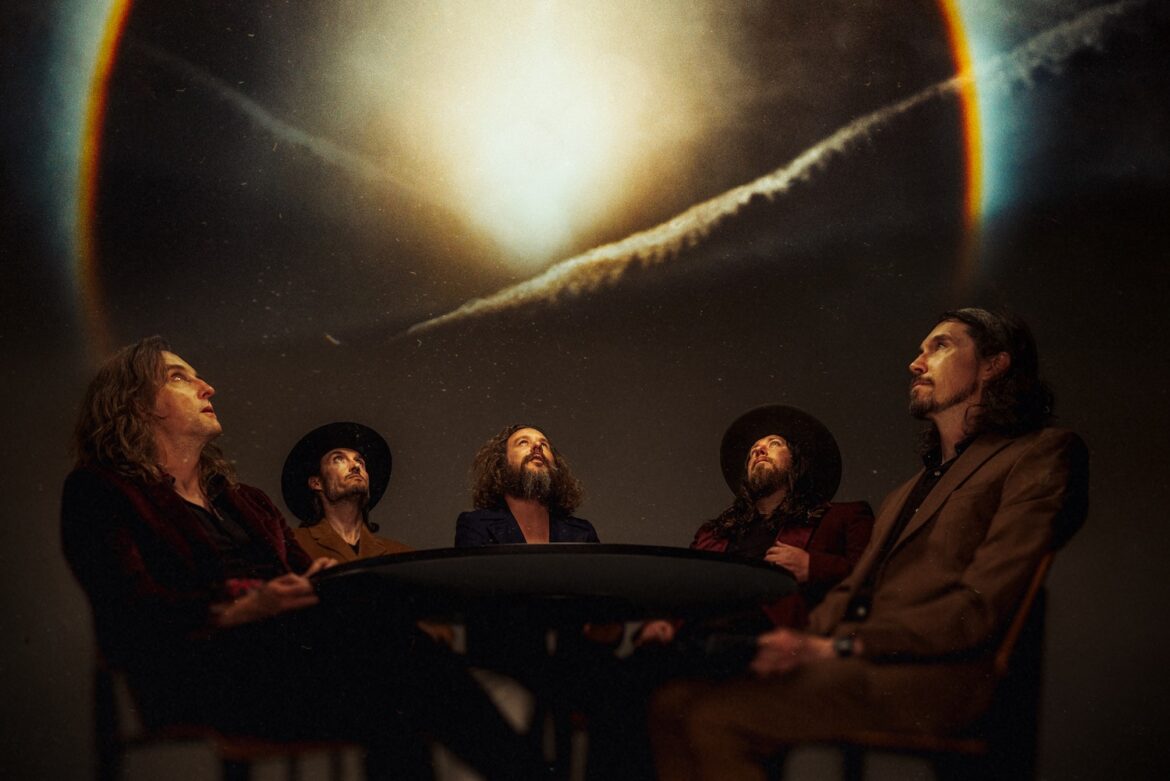
 © Silvia Grav
© Silvia Grav